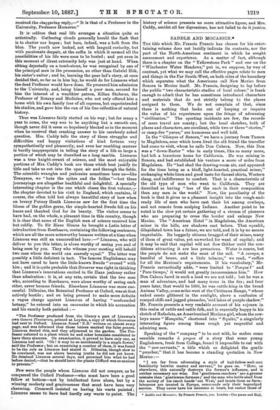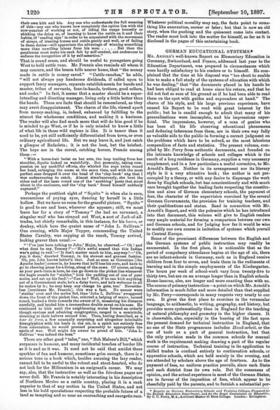SADDLE AND MOCUSSIN.* Tim title which Mr. Francis Francis has
chosen for his enter- taining volume does not lucidly indicate its contents, nor the part of the North-American continent in which he sought amusement and experience. As a matter of fact, although there is a chapter on the " Yellowstone Park " and one on the " Winchester Water Meadows," put in, we suppose, by way of contrast, yet what we may call the effective pages relate to men and things in the Far South-West, on both sides of the boundary which separates what the Americans call New Mexico from Sonora in Mexico itself. Mr. Francis, designing to lay before the public " two characteristic studies of local colour," is frank enough to admit that he has sometimes introduced characters and materials that do not strictly belong to the places assigned to them. We do not complain of that, since there is nothing that looks out of keeping or impairs the value of his experiences upon the fringe of advancing "civilisation." The sporting incidents are few, the records of mere travel are scanty ; but the local sketches, both of places and characters, are excellent, while two or three "stories," or camp-fire "yarns," are humorous and well told.
In the " Glimpse of Sonora," we have a journey from Tucson to Magdalena, near which town lived the old friend the traveller had come to visit, whom he calls Don Cabeza. Now, this Don was a " down-Easter " who in early times, like so many more, had left a luxurious home for California.. He was mining in Sonora, and had established his venture a score of miles from Magdalena. He "had shed the drawing-room air, and appeared for the time being as a bluff, light-hearted, practical miner," exchanging white linen and good taste for flannel shirts, Western slang, and indifference to comfort. That is a characteristic of the old type of men who went to California. They are described as having " less of the snob in their composition than any men in the world." Now, the peculiarity of the book is that it gives us a pleasant insight into the rough-and- ready life of men who have cast their lot among cowboys, and not remote from scalping Indians. Another point to be noted is the slow yet certain gathering of a stream of pioneers who are preparing to cross the border and enlarge New Mexico. The "American Hotel " in Magdalena, the American miner in the hills, are shadows cast before. That squalid, dilapidated town has a future, we are told, and it is by no means improbable. Its beggarly citizens bragged of their mines, many of them of great value, yet unworked for want of capital; and it may be said that capital will not flow thither until the con- ditions attracting it are less precarious. Water is scarce, but the people do not make the most of the soil. "A romper, a handful of beans, and a little tobacco," we read, "suffice for all the Mexican's requirements. If his vocabulary," Mr- Francis sarcastically adds, " were limited to ' Porque P' and 'Poe° tiempo,' it would not greatly inconvenience him." How Don Cabeza fared in such a land we are not told; but he was a man of adventure, and had many irons in the fire; and four years later, that would be 1886, he was cattle-king in the broad Animas Valley, some miles west of the Chiricana Range, " whose naked crests glittered in the sunlight, above a confusion of scarped cliffs and jagged pinnacles, 'mid lakes of purple shadow." Mr. Francis presents a very readable account of his sojourn in this realm of cattle and cattle folk, and is especially happy in his sketch of Rafaeleta, an Americanised Mexican girl, whom the cow- boys name " Mosquito," shortened into " Squito," a singularly interesting figure among these rough yet respectful and admiring men.
Speaking of the " company " to be met with, he makes some sensible remarks a propos of a story that some young Englishmen, fresh from College, found it impossible to eat with the " cow-servants," a title which so delighted the gentle "puncher," that it has become a standing quotation in New Mexico :— " I am far from advocating a style of hail-fellow-well. met familiarity betwixt master and servant," he goes on. "Here, us elsewhere, this naturally destroys the former's influence, and is neither necessary nor wise. But ' gentlemen.ranohers ' are a greater mistake than gentlemen-farmers; and the man who bolds aloof from the impiety of his ranch hands 'out West,' and treats them as farm- labourers are treated in Europe, commands only their begrudged service. They never have his interests at heart, bat rather those of • Boddie and Mocaasin. By Francis Francis, jun. London: Ohs ems. and Hall. their own kith and kin. Any one who understands the full meaning of this—any one who knows how completely the option lies with the cow-puncher of working or not, of riding the range honestly or shirking the doing so, of learning to know the cattle on it and their habits, of 'reading sign' in order to be acquainted with the movement of strays, of treating horses and cattle gently and well, or of failing in these duties—will appreciate the advantage of winning something
more than unwilling labour from his men Bat then the gentleman must make his rank felt by self-control, not endeavour to enforce the recognition of it by self-assertion."
That is sound sense, and should be useful to youngsters going West to hold cattle runs. Mr. Francis also reminds all whom it may concern, and the lesson tells nearer home, that "the money made in cattle is money saved." " Cattle-ranches," he adds, "will not always pay handsome dividends, if called upon to support fancy managers, separate establishments for hands and master, tribes of servants, four-in-hands, trotters, good cellars, and cooks." In fact, it seems that a master should be a super- intending and directing manager, living only a little better than the hands. These are facts that should be remembered, as they may avert disappointment. The charm of the life, viewed apart from money-making, is, indeed, enhanced by fulfilling to the utmost the wholesome conditions, and making it a business. The reader will also find math more that will do him good if he is minded to go West, or if he is only minded to know a little of what life in these wild regions is like. It is tamer than it used to be, yet still sufficiently differentiated from town, or even ordinary agricultural life. But we may leave it, and just catch a glimpse of Rafaeleta ; it is not the beet, but the briefest. The boys are in the corral, catching horses, Francis among them :— " With a horse-hair lariat on her arm, the loop trailing from her shoulder, Squito looked on watchfully. Bat presently, taking com- passion on my unskilful efforts, she whirled the rope twice round her bead, enlarging the noose at the same time, and with the most perfect ease dropped it over the bead of the 'clay-bank' nag that I was endeavouring to catch. Almost simultaneously, she bent the other end of the lasso round one of the ' snubbing' poste that stood about in the enclosure, and the ' clay bank' found himself suddenly captured."
Perhaps the prettiest sight of "Squito" is when she is seen, unconscious of prying eyes, dancing by herself in a little hollow. Bat we have no room for the graceful picture. " Sqnito " is good to see and hear, wherever she appears ; still, we must leave her for a story of "Tommy" (he had no surname), a
singular waif who has strayed out West, a sort of Jack-of-all- trades, but chiefly remarkable, in this instance, for his burro, or
donkey, which bore the quaint name of "John L. Sullivan." One evening, while Major Topper, commanding the United States Cavalry, was supping at the ranch, Tommy arrived, looking graver than usual:—
" 'I've just been talking to John,' Major, he observed.—' Oh ! and what does he say, Tommy ?'—' He's awful scared that this Indian war's going to end.'—' It don't matter much to him, anyway.'—' Oh, yes, it does,' drawled Tommy, in his slowest and gravest fashion. Oh, yes, John knows better'n that. Ind as soon as Geronimo [the Apache leader] comes in, he knows that he'll lose his corn, and have to go to chewing grass for a living, along of the cows. Of course, as long as your pack-train is here, be can go down to the picket line whenever the bugle sounds for "stables," kick the padding oat of one of your mules, and eat up his feed.'—' Can he ? Well, if be can kick anything out of a Government mule, he's a daisy burro, and he's welcome to all he makes by it ; he may keep any change he gets, too.' Neverthe- leas [continues Mr. Francis], this was a fact. No sooner were 'stables' over and the mules fed, than 'John L. Sullivan' swaggered down the front of the picket line, selected a helping of maize, turned round, backed a little towards the owner of it, measuring his distance carefully, and landed him a tremendous doable carat on his nose. He continued to kick until the neighbouring mules formed an orderly though envious and admiring congregation, ranged in a semicircle, straining-at their halters around him. Then, having described, as a tour de force, a few unusually surprising and altogether inimitable hieroglyphics with his heels in the air, in a spirit not entirely free from ostentation, be would proceed peaceably to appropriate the spoils of war. Well might his owner be proud of him. 'John L. Sullivan' was indeed the boss."
There are other good "tales," one, "Bob Malone's Bill," which surpasses in humour, and many incidental touches of border life as it is and as it was. It need not be said that amidst these sparkles of fan and humour, sometimes grim enough, there is a serious tone in a book which, besides amusing the lazy reader, cannot fail to be useful to the robust and stout-hearted, who do not look for the Millennium in an emigrant's career. We may say, also, that the instructive as well as the frivolous pages are never dull. Mr. Francis is notably interesting in his description of Northern Mexico as a cattle country, placing it in a rank superior to that of any section in the United States, and not less in his bold speculations respecting the probable fatore of a land so tempting and so near an encroaching and energetic race.
Whatever political morality may say, the facts point to some- thing like annexation, sooner or later; but that is now an old story, when the pushing and the quiescent come into contact. The reader must look into the matter for himself, so far as it is disclosed in the pages of this entertaining book.



































 Previous page
Previous page